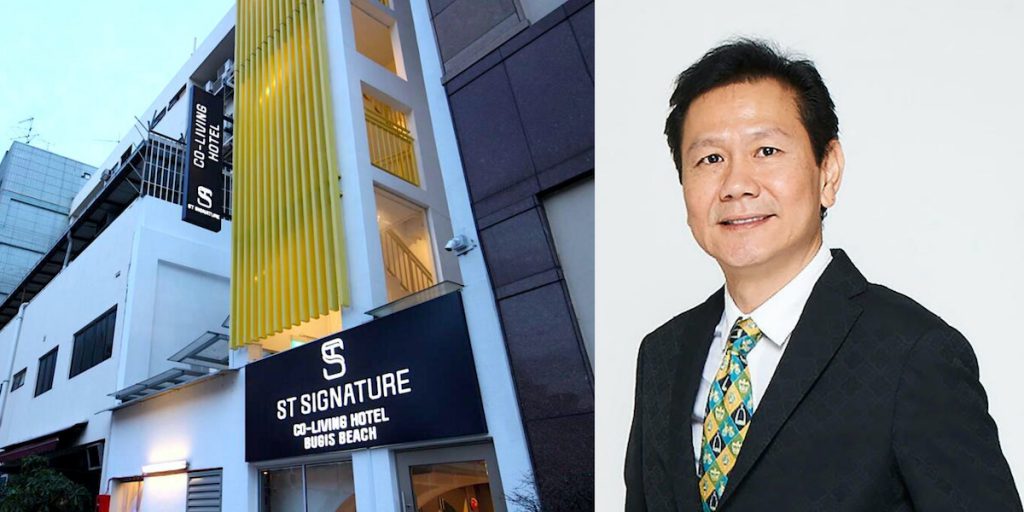Singapore’s hotel industry is suffering as Covid-19 squeezes the travel dollar dry.
In February, Singaporean hotels reported a 40 per cent drop in total revenue, with only 51 per cent total occupancy rate.
However, serial entrepreneur Alan Goh has no plans to pause the expansion of his homegrown hospitality brand anytime soon.
In spite of the pandemic, Alan just launched four “co-living hotels” in Singapore under the ST Signature brand and they have exceeded an 80 per cent occupancy rate even during the lockdown.
The key, says the entrepreneur, is to meet a hidden demand for “affordable luxury”.
Hitting The Hospitality Sweet Spot
ST Signature’s rooms don’t have the ample space of a traditional hotelier’s, but offers more privacy than hostel “capsule” accommodations.
For example, accommodation for single travellers is partitioned into compact private rooms via S-shaped bunk beds.
Travelers also share common spaces, like toilets, though over 70 per cent of the rooms at ST Signatures offers en suite bathrooms.
If not for the pandemic, the brand would have also launched co-living get-togethers and social events for their customers, says Alan.

By maximising space savings, one night in a private room at ST Signature can cost as low as S$40 for a single traveller on Bookings.com. That’s a price tag that applies to ST Signature’s highly competitive locations near the central business district, such as Tanjong Pagar and Chinatown.
ST Signature is also fully automated. Customers simply have to download the ST Hospitality app to check in-and-out, make payments, and collect their room PINs without ever having to visit the front desk.
The brand’s selling point is its ability to provide travellers with quality accommodation at reasonable prices, explains Alan.
By keeping costs low with space savings and tech optimisation, travellers can stay at quality residences on a budget.
A Hidden Demand For Accommodation

The co-living hotel franchise has kept its head above water by capturing three target demographics.
This includes foreigners locked in Singapore during the circuit breaker, Singaporeans on staycations, and the growing stream of corporate travelers trickling in as travel lanes open.
Malaysians who couldn’t return home during the circuit breaker made up a sizeable portion of the foreigners staying at ST Signature’s co-living hotels.
The location, price and quality of ST Signature’s rooms made it an ideal choice for their budget, Alan explains.
By comparison, Singaporeans only make up around 30 to 40 per cent of the customers at ST Signature.
The co-living hotel also offers a minimum booking time that’s as short as five hours, which fits the needs of customers looking for “intimate time,” or travelers on stopovers.
A Knack For Giving Customers What They Want
Alan’s knack for filling market gaps is a trait he has honed since launching a nasi padang stall at Bishan’s Food Junction in 1993.
Back then, there was a dearth of halal Indian and Muslim food at the newly established shopping mall food courts.
“We had a perpetual queue for one year,” he recounts.
After expanding to over 40 stalls islandwide, the entrepreneur eventually launched restaurant brands in the 2000s, whose “overheads were cheaper than hawker stalls (at that time).”
Consolidated under the Katrina Group, Alan has launched over seveb
different F&B brands like Bali Thai, So Pho and Streats over a 20-year career.

The F&B brands were built to appeal to the tastes of expats and tourists by providing them with the cuisine of their homelands.
For instance, Chinese-concept restaurant like Hutong caters to Chinese tourists, while Mexican restaurant Muchos appeals to Americans around the popular Clarke Quay area.
In 2018, the group expanded to the hospitality industry when Alan’s brother, Joshua, and son, Donovan, sold their hostel startup to Katrina in order to incentivise growth.
There are so many old buildings around Singapore… Instead of leaving them vacant, with low occupancy, we took the property and turn it around in a short time…preserving the heritage of the building while making it more modern.
Alan Goh, Katrina Group Founder
Hospitality Trumps F&B In Scalability
Alan reveals that more projects are “in the pipeline”, and the firm plans to kickstart overseas operations as travel lanes open.
If not for the circuit breaker, another four projects would have been launched before the year’s end.
However, the Katrina Group has also experienced its fair share of losses — its second hospitality vertical, ST Residences, was reduced from 400 to about 200 serviced apartments, as residents moved back to their home countries while borders shut down.
Despite these setbacks, the group is ready for a “fast and aggressive expansion … without losing momentum,” says Alan.
Hospitality is more scalable because the product is differentiated and unique (whereas) the entry barrier for F&B is very low, highly competitive and it’s hard to transfer skill sets (overseas). It’s very competitive.
Alan Goh, Katrina Group Founder
The service business is clearly in his blood, and Alan’s not about to let up on his venture into hospitality.
“We want to develop a niche; we want to be the first-movers.”
Featured Image Credit: Booking.com / Katrina Group










